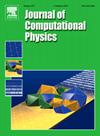A generalized transformed path integral approach for stochastic processes
IF 3.8
2区 物理与天体物理
Q2 COMPUTER SCIENCE, INTERDISCIPLINARY APPLICATIONS
引用次数: 0
Abstract
In this paper, we present the generalized transformed path integral (GTPI) approach: a grid-based path integral approach for probabilistic description in a large class of stochastic dynamical systems. We showcase the application of our proposed approach to non-singular systems, as well as to singular systems such as second-order (and higher-order) dynamical systems, dynamical systems with zero process noise, and certain dynamical systems with non-white noise excitation. As a part of the approach, we present a novel framework for the description of stochastic dynamical systems in terms of a complementary system—the standard transformed stochastic dynamical system—obtained through a dynamic transformation of the state variables. The state mean and covariance of the transformed system do not change with evolution and the choice of our transformation parameters ensure that they are zero and identity respectively. Thus, the probability density function (PDF) for the state of the transformed system can be evolved in a transformed space where greater numerical accuracy for the distribution can be ensured. A fixed grid in the transformed space coordinates corresponds to an adaptive grid in the original space coordinates; it allows the proposed approach to more efficiently address the challenge of large drift, diffusion, or concentration of PDF in the stochastic dynamical system. In addition, error bounds for distributions in the transformed space can be easily obtained using Chebyshev's inequality. We use an operator splitting–based solution of the Fokker-Planck equation associated with the transformed system to derive a novel short-time propagator and update relations for the evolution of the transformed state PDF in the transformed space. Necessary update relations for the mean and covariance of the original state variables, used in the evolution of the transformed state PDF, are derived from the underlying stochastic models. Illustrative examples were considered to showcase the benefits of the GTPI approach over conventional fixed grid (FG) approaches in a large class of stochastic dynamical systems. In all the cases, results obtained using the GTPI approach show excellent agreement with results from Monte Carlo simulations and available analytical (and stationary) solutions, while results from the FG approach show large errors. The effect of simulation parameters and system parameters on the numerical error in our approach were also studied.
随机过程的广义变换路径积分方法
本文提出了广义变换路径积分(GTPI)方法:一种基于网格的随机动力系统概率描述路径积分方法。我们展示了我们提出的方法在非奇异系统中的应用,以及奇异系统,如二阶(和高阶)动力系统、零过程噪声的动力系统和某些非白噪声激励的动力系统。作为该方法的一部分,我们提出了一个新的框架来描述随机动力系统的互补系统-标准变换随机动力系统-通过状态变量的动态变换得到。变换后系统的状态均值和协方差不随演化而变化,变换参数的选择保证了它们分别为零和恒等。因此,转换后的系统状态的概率密度函数(PDF)可以在转换后的空间中演化,从而可以确保更高的分布数值精度。变换后的空间坐标中的固定网格对应于原空间坐标中的自适应网格;它允许提出的方法更有效地解决随机动力系统中PDF的大漂移,扩散或浓度的挑战。此外,利用切比雪夫不等式可以很容易地得到变换空间中分布的误差界。我们使用基于算子分裂的与变换系统相关的Fokker-Planck方程解,导出了变换后的状态PDF在变换空间中的演化的一种新的短时传播子和更新关系。原始状态变量的均值和协方差的必要更新关系,用于转换后的状态PDF的演化,从底层的随机模型导出。举例说明了GTPI方法在一类随机动力系统中优于传统固定网格(FG)方法的优点。在所有情况下,使用GTPI方法获得的结果与蒙特卡罗模拟和可用的解析(和平稳)解决方案的结果非常吻合,而FG方法的结果显示出较大的误差。研究了仿真参数和系统参数对数值误差的影响。
本文章由计算机程序翻译,如有差异,请以英文原文为准。
求助全文
约1分钟内获得全文
求助全文
来源期刊

Journal of Computational Physics
物理-计算机:跨学科应用
CiteScore
7.60
自引率
14.60%
发文量
763
审稿时长
5.8 months
期刊介绍:
Journal of Computational Physics thoroughly treats the computational aspects of physical problems, presenting techniques for the numerical solution of mathematical equations arising in all areas of physics. The journal seeks to emphasize methods that cross disciplinary boundaries.
The Journal of Computational Physics also publishes short notes of 4 pages or less (including figures, tables, and references but excluding title pages). Letters to the Editor commenting on articles already published in this Journal will also be considered. Neither notes nor letters should have an abstract.
 求助内容:
求助内容: 应助结果提醒方式:
应助结果提醒方式:


